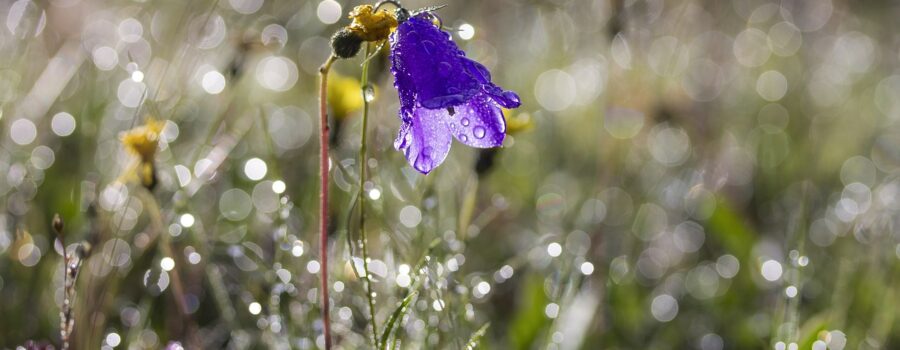There is an element without which life on earth would be impossible. I am referring to water, one of the four basic elements in Greek philosophy. Together with earth and air, water forms the triad indispensable for life; and considering that only 3% of all the water found on the face of the earth is drinkable, i.e., sweet water, rain and dew are absolutely necessary for the survival of the natural world. This makes the utterance of Elijah the Tishbite the more challenging when he told king Ahab:
As the Lord God of Israel lives, before whom I stand, there shall not be dew nor rain these years, except at my word.” (1 Kings 17:1)
His message was explicit: God, the Creator of water, is sovereign over it.
Now much has been said about rain, but little about the dew coming down from heaven. In the verse above, Elijah juxtaposes the two entities as David had done a century earlier:
O mountains of Gilboa, let there be no dew nor rain upon you, nor fields of offerings… (2 Sam. 1:21).
The message of these two men implies that dew, as rain, is necessary for the preservation of life. In fact, dew is more vital than what we may apprehend at first, and its contribution is crucial for the well-being of any organic life.
A parallel necessity
What is true about the natural world is also true about its spiritual counterpart. The Scripture is explicit: There is an equivalent to rain and dew in the spiritual realm. However, in this post, I will concentrate on the latter, i.e., on that underestimated existent called dew.
Unpretentious and valuable
Contrary to rain, dew comes discreetly and silently, exhibiting little showiness. Its promises remain hidden beyond the veil of sincerity and truth, and the modest in heart values it as gold, for even in time of draught it keeps the guileless seeker fresh and green.
Graciously, dew descents with life in its breath and ascent when its purpose has been fulfilled. It generally comes when most of the observers are sleeping, and evaporates before they awake. Unnoticed by the agitated busy bee, it reposes on the meditative mind, away from the worldly hullabaloo of modern life. Such are the colors of its courtesy, and such is the whisper of its counsel.
The blessings of Isaac and Moses
Isaac, understanding the essentialness of dew, blessed Jacob with these words:
Surely, the smell of my son is like the smell of a field which the Lord has blessed. Therefore may God give you of the dew of heaven, of the fatness of the earth, and plenty of grain and wine.” (Gen. 27:27,28)
Here the accent is put on the dew, not on the rain. Likewise, when he blessed Esau he told him:
Behold, your dwelling shall be of the fatness of the earth, and of the dew of heaven from above.” (Gen. 27:39)
Both blessings associate the fatness of the earth with the dew of heaven. The same is seen in the blessing Moses bestowed on the tribe of Joseph:
Blessed of the Lord is his land, with the precious things of heaven, with the dew, and the deep lying beneath” (Deut. 33:13).
And to the tribe of Asher he said:
Then Israel shall dwell in safety, the fountain of Jacob alone, in a land of grain and new wine; His heavens shall also drop dew.” (Deut. 33:28)
What I am saying is that these people had understood the importance of the dew coming down from heaven. For them, this precious gift was not inferior to the rain. They regarded it has a manifestation of God’s faithfulness and grace. In contrast, at times, we Christians tend to underrate the unpretentious blessing. We seek spiritual rain and little else. We want abundant water and want it at once. So we long for mighty visitations and pay little attention to the quiet ministration of the Spirit, to that still small voice that revives the soul and replenishes the heart. Added to it, our concept of rain is often warped and distorted by evangelical propaganda. So we seek it amidst the sounds of boisterous “revivals” while swimming in the blasts of loudspeakers and flamboyant presentations. And even if our concept of rain is biblical, our expectation is often contaminated by impatience and disquietude.
The wise man had it right:
The king’s wrath is like the roaring of a lion, but his favor is like dew on the grass.” (Prov. 19:12)
It is often in quietness that a person can obtain the peaceful blessing. That’s right! God’s favor can distill upon us as dew. His speech can settle on our branch, causing a refreshing and a flourishing of its own:
My root is spread out to the waters, and the dew lies all night on my branch. My glory is fresh within me, and my bow is renewed in my hand.” (Job 29:19-20).
These words, uttered by Job, reveal the antidote to a stagnant Christian life, for dew can turn a routine into a passion and cause the monotonous cactus to flourish in full glory.
We are also told that to live in harmony and unity with the brethren brings a blessing reminiscent to the dew of Hermon descending upon the mountains of Zion (Psalm 133:3). It is indeed life imparting.
A vivifying promise
One thing is certain: we will not have rain every day. Therefore we need that soft provision, that peaceful ministration which remains undisturbed by the charivari of worldly affairs. It is this or barrenness, a refreshing or a drying-up.
The promise stands firm:
I will be like the dew to Israel; He shall grow like the lily, and lengthen his roots like Lebanon. (Hosea 14:5)
That’s right! We need dew to stay green and thrive in God’s grace.
On my next post I will present some necessary conditions to receive refreshing dew from heaven.
If you think this post can help somebody you can share it with one of the options presented bellow.













